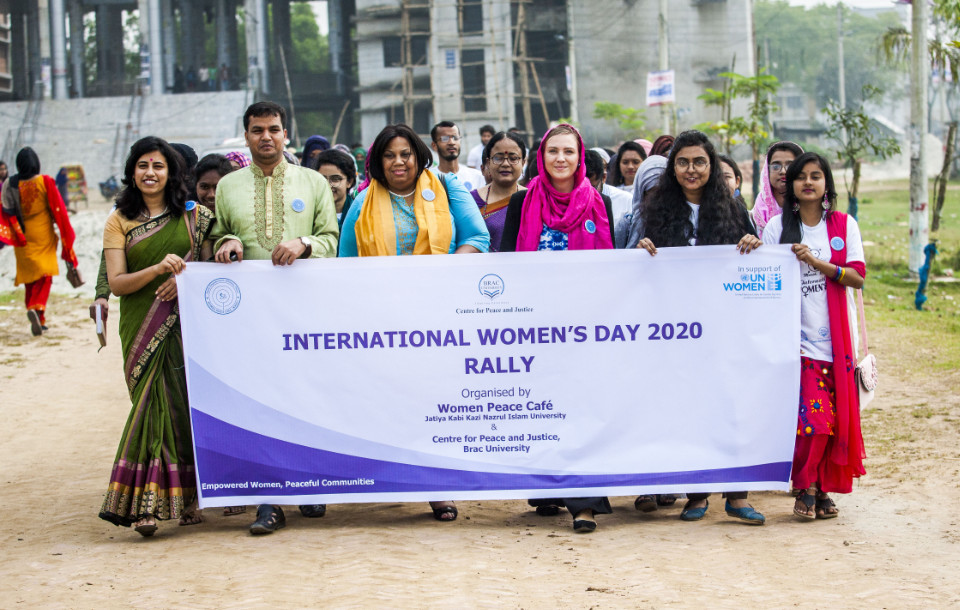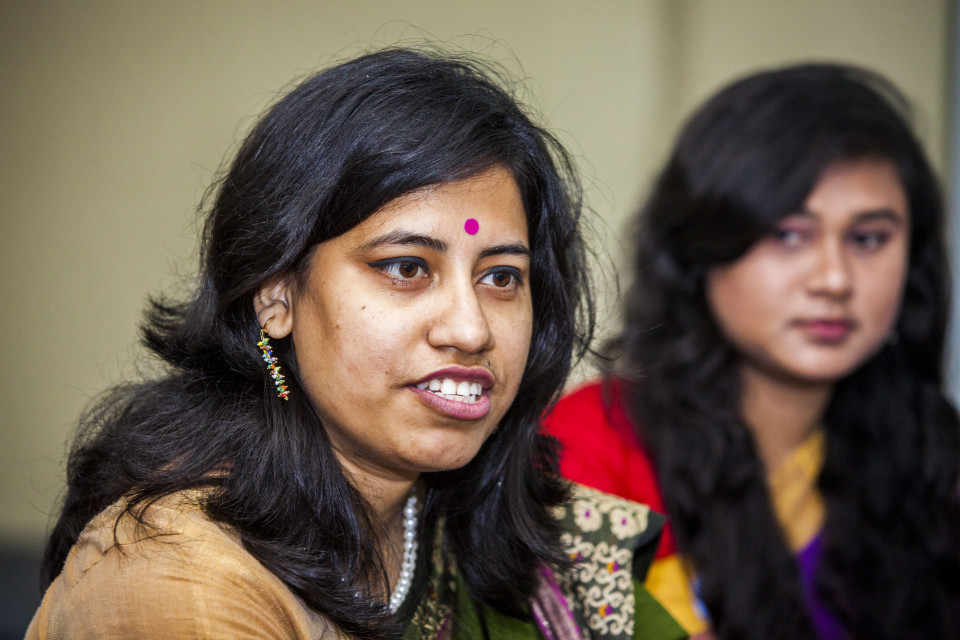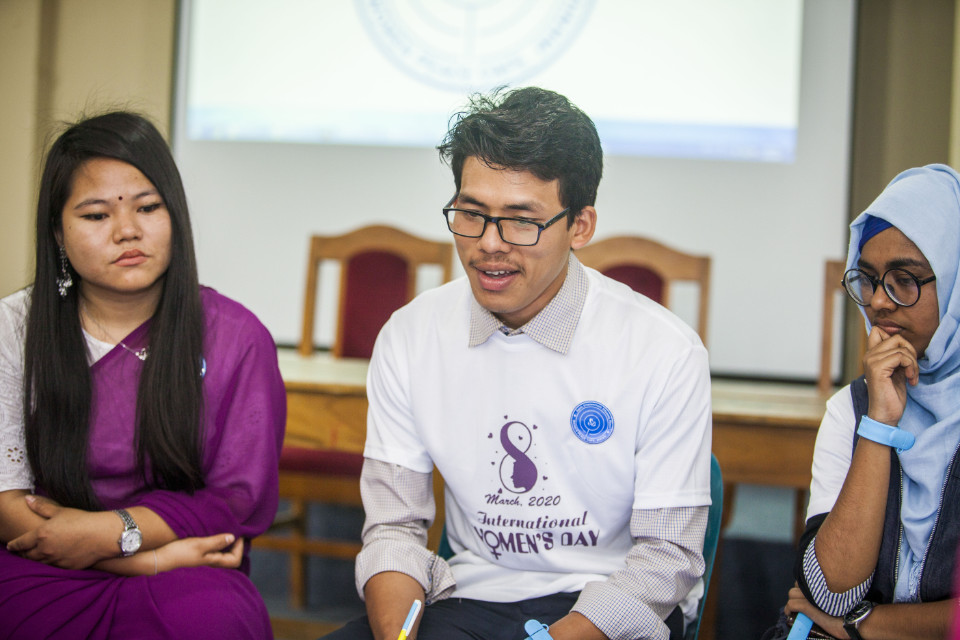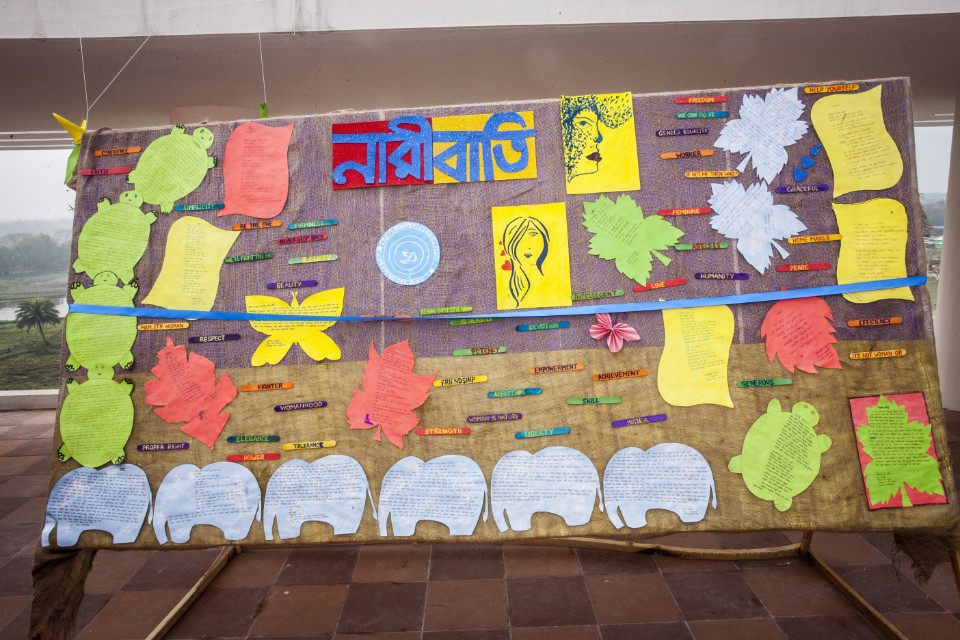Female university students in Bangladesh build resilient communities through social entrepreneurships
Date:
Author: Fanny Arendt

Mymensingh, Bangladesh – The campus was covered in purple on 8 March as more than 100 students and faculty members of the Jatiya Kabi Kazi Nazrul Islam University (JKKNIU) gathered to commemorate International Women’s Day 2020 together with UN Women and Brac University.
The colour purple is historically associated with efforts to achieve gender equality and the female students of JKKNIU are truly doing this as they are taking on leadership roles to promote peace through women’s empowerment in Bangladesh.
Since 2018, UN Women has, in partnership with the Centre for Peace and Justice of Brac University, supported female students to become business leaders, innovators and peace advocates in Bangladesh. This initiative is part of the regional programme titled Empowered Women, Peaceful Communities, funded by the Government of Japan.
The establishment of the Women Peace Café (WPC) has been central in the efforts to promote women’s leadership. The WPC is a university-based meeting platform where female students discuss problems in their communities and come up with innovative solutions to strengthen social ties among community members. To date, the WPC has gained ground at two universities in Bangladesh; Begum Rokeya University in Rangpur (BRUR) and JKKNIU, which have enabled more than 300 female students to become social entrepreneurs and 50 innovative business plans to be developed.
Ms. Mahmuda Sultana Shorna, the President of WPC JKKNIU, has built her business idea on mental health support. As university students feel pressured to have successful and prosperous careers, she recognises how the challenges in achieving this may result in depression, isolation and a reduced sense of togetherness in her society. To prevent students from choosing the wrong paths in life, she is working with professional psychologists at JKKNIU to facilitate seminars on Women Reproductive Health and Depression. By encouraging youth to speak about traditionally silenced matters, she is able to grow as a person and make positive impact on her society. “I never thought of myself as a leader until I joined WPC, but now I am a successful entrepreneur and change-maker in my society”.

Young women play an important role as change-makers in societies. Not only are they combating issues of inequalities and sexual harassment, they also contribute to preventing violent extremism. A study from 2020 show that more than 80 per cent of Bangladeshi students believe that religious radicalization and violent extremism are problems in their communities [1] . Moreover, a recent research conducted by Monash University and supported by UN Women in four countries, including Bangladesh, found that hostile sexism and support for violence against women are strongly associated with support for violent extremism . Thus, empowering women and promoting gender equality need to be critical components of preventing violent extremism [2]. When given the chance, female students have proven successful to lead in preventive initiatives.
Sunzida Islam Era, a WPC executive at JKKNIU, describes how their weekly meetings on the top floor of a campus building give her an opportunity to voice concerns on matters that are important to her society. “For me, WPC is a safe space where we support each other in the promotion of peace, gender equality and critical thinking”. This sentiment is echoed by Probin Tripura, one of the 30 male volunteers at WPC JKKNIU. Since he joined the WPC in 2019, many male students have accompanied him in supporting female students to take up leadership roles. “It may be named Women’s Peace Café, but it is a gender-inclusive community. When male students support women’s empowerment, messages of peace and gender equality will reach more people”.

Collective efforts and knowledge exchange are important elements of WPC. To ensure sustainability of the social entrepreneurships, female students receive support from faculty members who have extensive experience in economics and entrepreneurship. Through trainings and workshops, mentors provide with hands-on advice on how to develop social enterprises that could work in their communities. Wali Ullah, university professor and chief mentor at WPC JKKNIU, says that the successes are remarkable. “We get new members all the time and as a mentor, I will keep providing with support and trainings so that we can sustain the positive outcomes of this programme.”
On the occasion of International Women’s Day, WPC JKKNIU undertook a number of initiatives to showcase their achievements. This included inauguration of a wallpaper magazine where reflections on gender and peace are symbolized through art, an award ceremony for outstanding business ideas, and messages on future outreach activities. In continuing the journey to build resilient communities, WPC members will extend their activities to include communities outside the campus area. In this way, young female innovators use their knowledge and skills to inspire community members across Bangladesh to collectively build peaceful and resilient communities through social entrepreneurships.

[1] Huq, S, and Badiuzzaman, M, Knowledge (2020) “Attitude and Practice of Youth in Promoting Peace and Social Cohesion, Center for Peace and Justice” BRAC University and UN Women Bangladesh (2020)
[2]“Misogyny & violent extremism: implications for preventing violent extremism” (2019)https://asiapacific.unwomen.org/en/digital-library/publications/2019/10/misogyny-violent-extremism